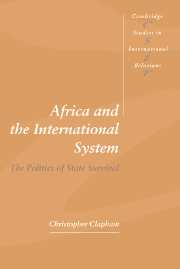Book contents
- Frontmatter
- Contents
- Acknowledgements
- List of acronyms and abbreviations
- Part I African states and global politics
- Part II Patterns of alliance
- Part III Struggling with decay
- 7 The international politics of economic failure
- 8 The Externalisation of political accountability
- 9 The International politics of insurgency
- 10 The privatisation of diplomacy
- 11 Conclusion
- Notes
- Bibliography
- Index
- CAMBRIDGE STUDIES IN INTERNATIONAL RELATIONS 50
10 - The privatisation of diplomacy
Published online by Cambridge University Press: 09 October 2009
- Frontmatter
- Contents
- Acknowledgements
- List of acronyms and abbreviations
- Part I African states and global politics
- Part II Patterns of alliance
- Part III Struggling with decay
- 7 The international politics of economic failure
- 8 The Externalisation of political accountability
- 9 The International politics of insurgency
- 10 The privatisation of diplomacy
- 11 Conclusion
- Notes
- Bibliography
- Index
- CAMBRIDGE STUDIES IN INTERNATIONAL RELATIONS 50
Summary
African statehood and international relations
The increasing importance of insurgent movements in Africa, and especially their ability to gain access to the international system on terms approaching those available to formally recognised governments, constitutes a challenge, not only to the quest for survival of African states themselves, but also to the way in which the international relations of the continent has conventionally been analysed and understood. This challenge forms part of a wider questioning of the nature of international relations in the wake of the end of the Cold War, and the processes of globalisation which may be seen as underlying it.
As was noted in the first chapter, international relations as a subject of academic study has conventionally been primarily concerned with the interaction between states. This has not, of course, excluded the recognition that states themselves are complex and variable structures, the behaviour of which in the international arena is often critically affected by their internal composition, and especially by the nature of their domestic power structure. Nor has it ignored the increasing importance of international institutions, and the development of an international system which exercises a very powerful influence over the behaviour of individual states. The recognition of the constraints on state policy imposed by incorporation into a single global economy, and the growth of the sub-discipline of international political economy to investigate these constraints, has played a very important part in this process. States none the less continue to provide the central focus of attention, linking the foreign or international sphere on the one hand, to the domestic or national one on the other.
- Type
- Chapter
- Information
- Africa and the International SystemThe Politics of State Survival, pp. 244 - 266Publisher: Cambridge University PressPrint publication year: 1996



